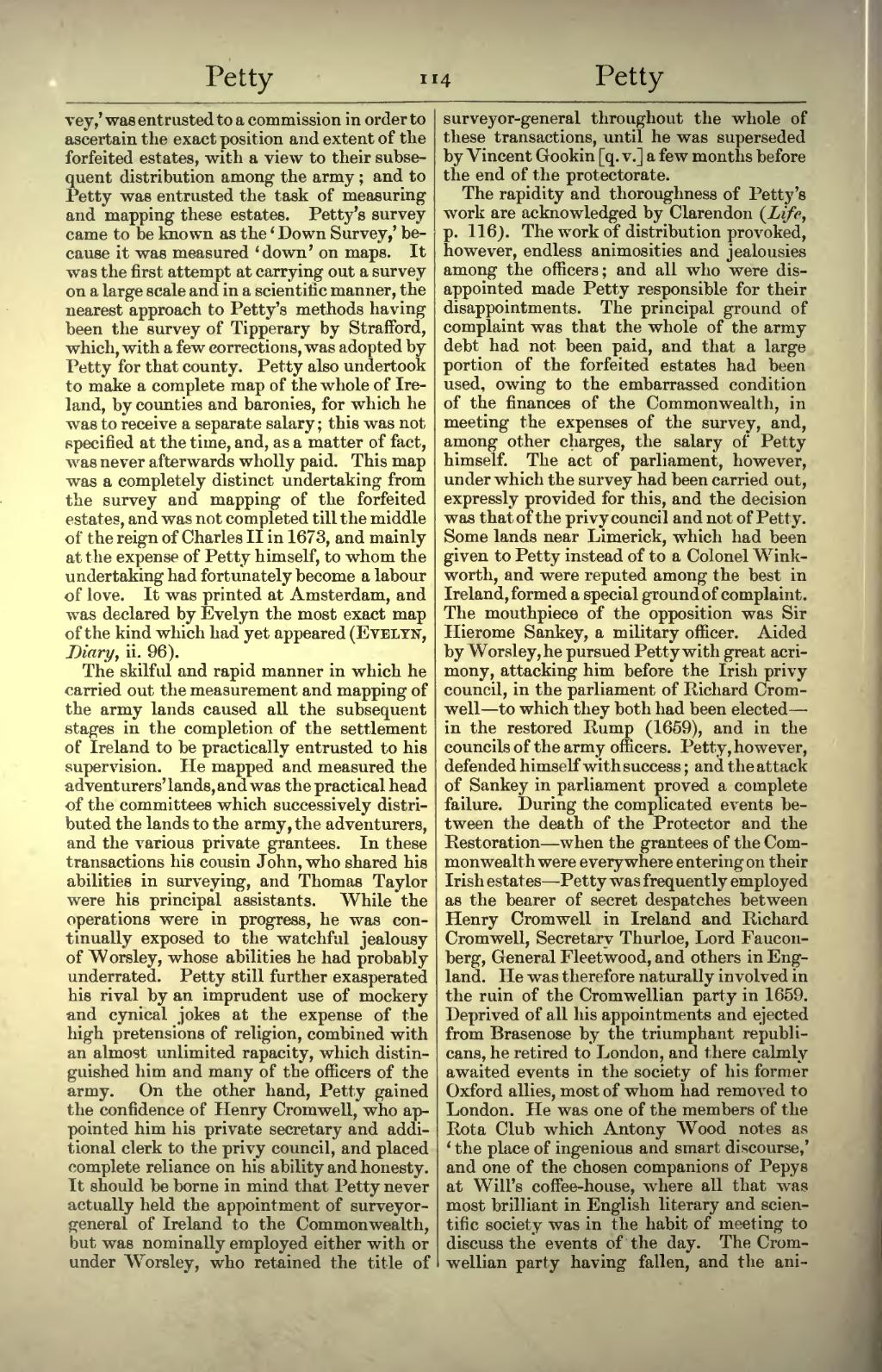vey,’ was entrusted to a commission in order to ascertain the exact position and extent of the forfeited estates, with a view to their subsequent distribution among the army; and to Petty was entrusted the task of measuring and mapping these estates. Petty's survey came to be known as the ‘Down Survey,’ because it was measured ‘down’ on maps. It was the first attempt at carrying out a survey on a large scale and in a scientific manner, the nearest approach to Petty's methods having been the survey of Tipperary by Strafford, which, with a few corrections, was adopted by Petty for that county. Petty also undertook to make a complete map of the whole of Ireland, by counties and baronies, for which he was to receive a separate salary; this was not specified at the time, and, as a matter of fact, was never afterwards wholly paid. This map was a completely distinct undertaking from the survey and mapping of the forfeited estates, and was not completed till the middle of the reign of Charles II in 1673, and mainly at the expense of Petty himself, to whom the undertaking had fortunately become a labour of love. It was printed at Amsterdam, and was declared by Evelyn the most exact map of the kind which had yet appeared (Evelyn, Diary, ii. 96).
The skilful and rapid manner in which he carried out the measurement and mapping of the army lands caused all the subsequent stages in the completion of the settlement of Ireland to be practically entrusted to his supervision. He mapped and measured the adventurers' lands, and was the practical head of the committees which successively distributed the lands to the army, the adventurers, and the various private grantees. In these transactions his cousin John, who shared his abilities in surveying, and Thomas Taylor were his principal assistants. While the operations were in progress, he was continually exposed to the watchful jealousy of Worsley, whose abilities he had probably underrated. Petty still further exasperated his rival by an imprudent use of mockery and cynical jokes at the expense of the high pretensions of religion, combined with an almost unlimited rapacity, which distinguished him and many of the officers of the army. On the other hand, Petty gained the confidence of Henry Cromwell, who appointed him his private secretary and additional clerk to the privy council, and placed complete reliance on his ability and honesty. It should be borne in mind that Petty never actually held the appointment of surveyor-general of Ireland to the Commonwealth, but was nominally employed either with or under Worsley, who retained the title of surveyor-general throughout the whole of these transactions, until he was superseded by Vincent Gookin [q. v.] a few months before the end of the protectorate.
The rapidity and thoroughness of Petty's work are acknowledged by Clarendon (Life, p. 116). The work of distribution provoked, however, endless animosities and jealousies among the officers; and all who were disappointed made Petty responsible for their disappointments. The principal ground of complaint was that the whole of the army debt had not been paid, and that a large portion of the forfeited estates had been used, owing to the embarrassed condition of the finances of the Commonwealth, in meeting the expenses of the survey, and, among other charges, the salary of Petty himself. The act of parliament, however, under which the survey had been carried out, expressly provided for this, and the decision was that of the privy council and not of Petty. Some lands near Limerick, which had been given to Petty instead of to a Colonel Winkworth, and were reputed among the best in Ireland, formed a special ground of complaint. The mouthpiece of the opposition was Sir Hierome Sankey, a military officer. Aided by Worsley, he pursued Petty with great acrimony, attacking him before the Irish privy council, in the parliament of Richard Cromwell—to which they both had been elected—in the restored Rump (1659), and in the councils of the army officers. Petty, however, defended himself with success; and the attack of Sankey in parliament proved a complete failure. During the complicated events between the death of the Protector and the Restoration—when the grantees of the Commonwealth were everywhere entering on their Irish estates—Petty was frequently employed as the bearer of secret despatches between Henry Cromwell in Ireland and Richard Cromwell, Secretary Thurloe, Lord Fauconberg, General Fleetwood, and others in England. He was therefore naturally involved in the ruin of the Cromwellian party in 1659. Deprived of all his appointments and ejected from Brasenose by the triumphant republicans, he retired to London, and there calmly awaited events in the society of his former Oxford allies, most of whom had removed to London. He was one of the members of the Rota Club which Antony Wood notes as ‘the place of ingenious and smart discourse,’ and one of the chosen companions of Pepys at Will's coffee-house, where all that was most brilliant in English literary and scientific society was in the habit of meeting to discuss the events of the day. The Cromwellian party having fallen, and the ani-
